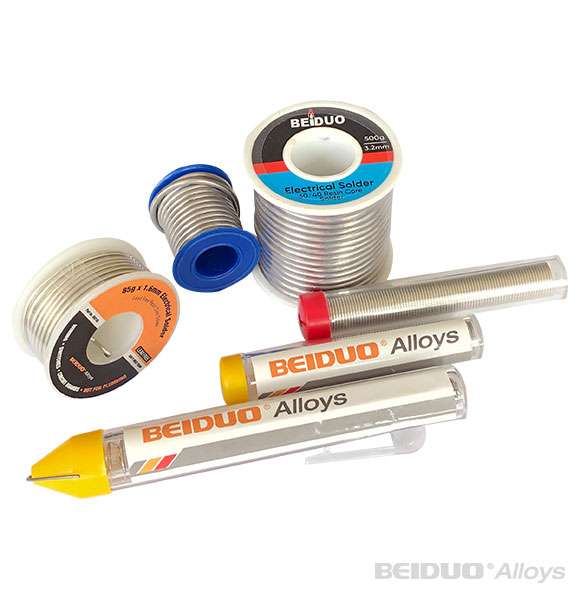
Lead-free Solder
Lead-free solder are available in cored wire as well as solid wire for various applications:
Electrical engineering
Electromechanics
Stainless steel
Aluminium
Plumbing solder
| Alloy components | Melting Range |
| Sn99.3Cu0.7 | 227℃ |
| Sn99.5Cu0.5 | 227℃ |
| Sn97Cu3 | 227℃ |
| Sn95Sb5 | 240-243℃ |
| Sn97Ag3 | 221-230℃ |
| Sn96.5Ag3.5 | 221℃ |
| Sn96Ag3.5Cu0.5 | 217-221℃ |
| Sn97.5Ag2Cu0.5 | 217-222℃ |
| Sn96Cu3.9Ag0.1 | 220℃ |
| Sn91.6Ag3.5Bi4.9 | 205-210℃ |
| Sn42Bi58 | 139℃ |
Tin Lead Solder & Flux
Tin-lead solder, also known as soft solder, is a traditional soldering material that has been widely used in various industries. The tin lead solder is commonly used for electronics. It also provides good electrical properties as well as mechanical strength. The solder ensures that electronic components are joined securely to contact points. Since the tin lead wire is lightweight, it won't put any unnecessary stresses on components.
| Alloy components | Melting Range |
| Sn95Pb5 | 183-224℃ |
| Sn90Pb10 | 183-215℃ |
| Sn65Pb35 | 183-186℃ |
| Sn63Pb37 | 183℃ |
| Sn60Pb40 | 183-190℃ |
| Sn55Pb45 | 183-203℃ |
| Sn50Pb50 | 183-215℃ |
| Sn45Pb55 | 183-217℃ |
| Sn40Pb60 | 183-238℃ |
| Sn35Pb65 | 183-248℃ |
| Sn30Pb70 | 183-248℃ |
You might like